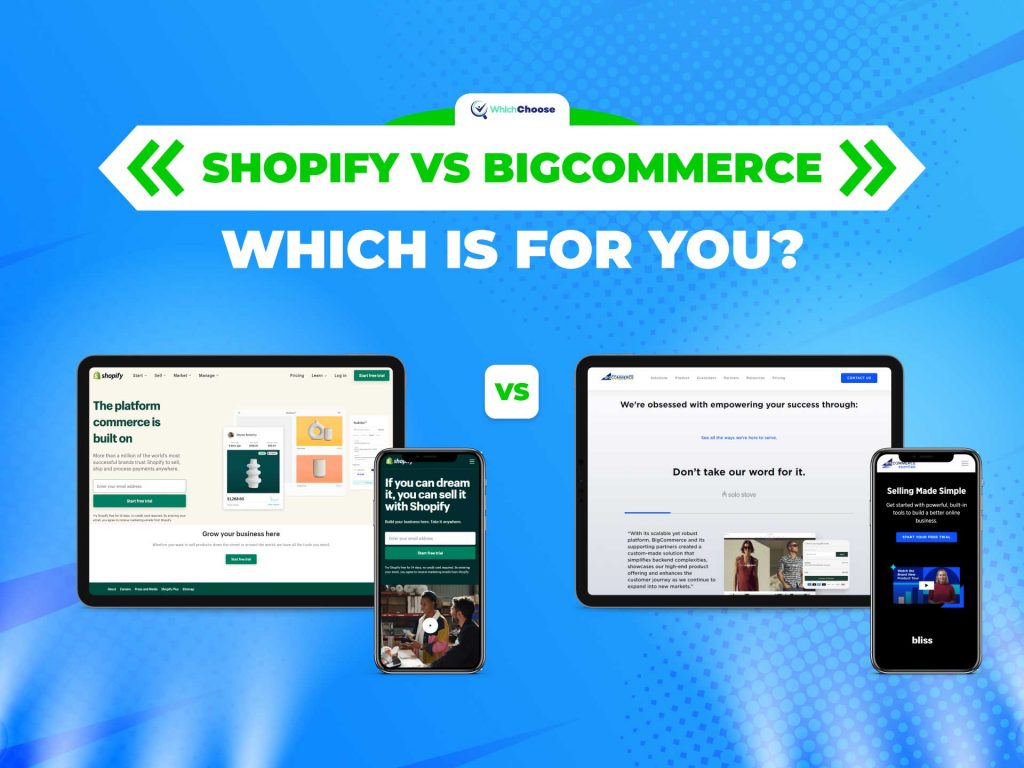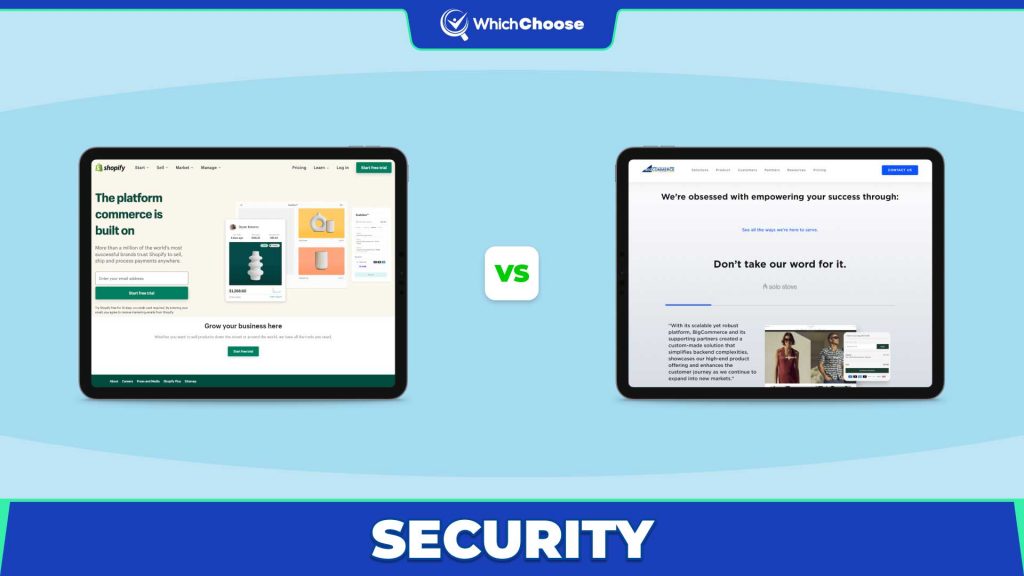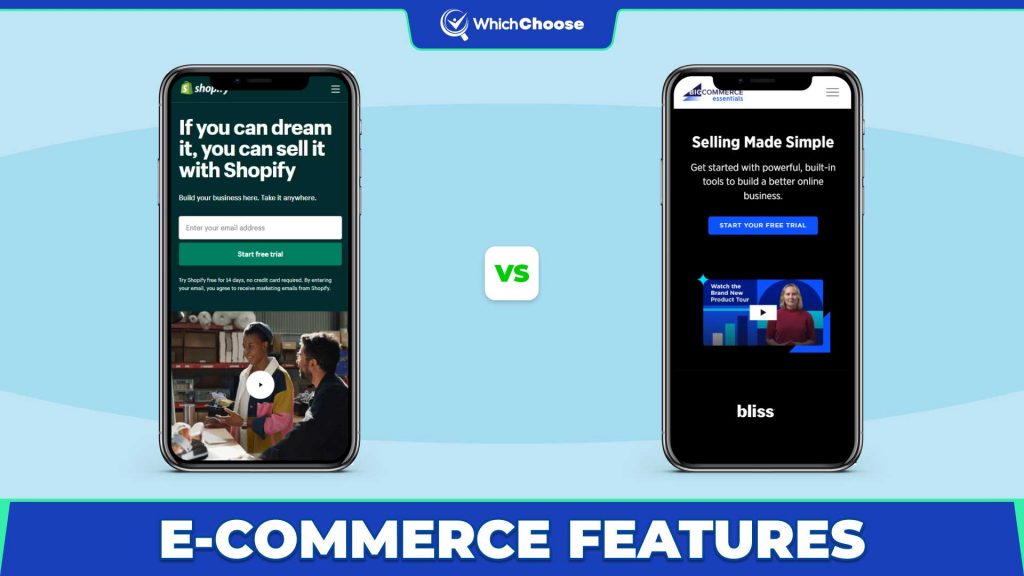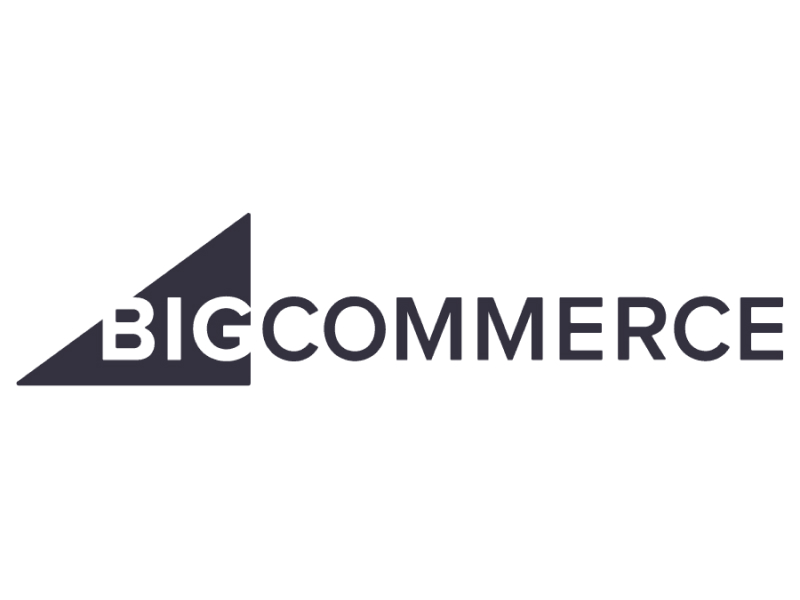Table of Contents
This post contains affiliate links. We earn an affiliate commission when you click our links to purchase products. It has no added cost to you.
Choosing what platform to go with is one of the biggest decisions you will make when starting an e-commerce store, but it is also one of the hardest. In this blog, WhichChoose will compare and contrast these two platforms to help you make the right choice: Shopify vs BigCommerce.

Shopify Vs BigCommerce: Overview
In 2021, 5 million jobs will be supported.
Millions of merchants around the world.
Shopify has 175 countries.
Smart inventory management.
Staff management.
Checkout.
Products.
Customers.
Reporting and analytics.
Hardware.
Shopify Payments.
Additional payments.
Marketing.
Meta Pay.
Apple Pay.
Stripe.
Authorize.Net.
2Checkout.
FirstData.
Amazon Payments.
Mid-market and enterprise TCO are outstanding.
Third-year digital commerce magic quadrant “Challenger.”
B2C, B2B, and Headless e-commerce platform pioneer.
Storefront conversion.
Headless commerce.
Cross-channel e-commerce.
B2B.
International.
Core commerce features.
Open platform.
Cash on Delivery.
Check.
Money Order.
Pay in Store.
1.1. Shopify
Shopify is a well-known e-commerce platform that small companies can use to set up online stores and sell their wares on the web and through social media. The business also offers point-of-sale systems for use in traditional stores.
It provides you with numerous resources for examining your online shop in detail. With these tools, users can get a better return on their marketing budgets by giving their target audiences personalized digital experiences. Automating customer service, stock control, financial transactions, and other processes is only one way this technology helps businesses save money.
1.2. BigCommerce
BigCommerce is an e-commerce solution that allows business owners to create a store and sell their products online. As long as they have access to a computer with a web browser and the Internet, they may set up shop and manage their online stores from anywhere in the world. Moreover, BigCommerce runs on its own servers, so you won’t need to invest in separate web hosting or other software to use it.
The platform provides many storefront layouts that can be modified to suit your needs, supports the sale of both tangible and digital products, and includes promotional tools to help you spread the word.
BigCommerce vs Shopify: Pros and Cons
Let’s dive into the comparison below to compare Shopify vs BigCommerce for the pros and cons.
Unique themes reduce design work.
Shopify’s dashboard makes website management easy.
Poor international scalability—uses third-party apps for multi-currency support.
Transaction fees apply without Shopify Payments.
All plans are transaction-free.
Have tons of sales features without installation.
Shopify has more configurable features.
Advanced features need training.
BigCommerce vs Shopify: Security

3.1. Shopify
Shopify ensures that your business and customers are safe by ensuring that all your stores are PCI (Payment Card Industry) compliant. As a result, financial and company information can be safeguarded.
When you add a custom domain to your Shopify store, an SSL certificate will be sent to you automatically. SSL (Secure Sockets Layer) certificates encrypt the information on the servers of your online shop and send it out over HTTPS instead of the less secure HTTP, which makes it much safer.
3.2. BigCommerce
BigCommerce secures all sites with numerous layers. PCI DSS (Payment Card Industry Data Security Standard) level 1 ensures that all servers that store credit card information are safe. This platform also used many powerful tools to increase its protection. These are file integrity scanners, perimeter, and server-specific firewalls, 24/7 human monitoring, intrusion detection software, and fraudulent transaction protection.
A trusted third-party SSL certificate for a domain or subdomain. It ensures that a secure website is correctly encrypted, keeping user data safe.
BigCommerce vs Shopify: Ease of Use
4.1. Shopify
Unlike other e-commerce solutions, Shopify is hosted on its own servers. That means it handles many of the back-end mechanics of running a store. Shopify will register your domain, host your website, and get SSL certificates for you.
You also don’t have to worry about software installations, management, or updates while using Shopify. Not to mention, safety and backups are not a concern.
4.2. BigCommerce
BigCommerce’s design and lexicon of technical terms can be intimidating to new users. As a result, you’ll need extra time to learn the ropes of the platform before you can begin constructing your store. Therefore, BigCommerce allows you to enhance your store with pre-built features.
Shopify Vs BigCommerce: E-Commerce Features

Check out the table below for Shopify vs BigCommerce analysis of e-commerce features:
| E-commerce Features | Shopify | BigCommerce |
| Sales Channels |
|
|
| Dropshipping |
|
|
| Point-Of-Sale | Shopify’s IOS and Android app for a point-of-sale system lets you sell your products in person. |
|
What platform has the strongest e-commerce features? At first glance, we can see that Shopify scores good marks in both sales channels and dropshipping options, which are the most important things to building success for one online business.
Shopify vs BigCommerce: Pricing
6.1. Shopify
There are five Shopify pricing plans to choose from.
- Plan 1: Lite: $9 per month
- Plan 2: Basic Shopify: $29/month
- Plan 3: Shopify: $79/month
- Plan 4: Advanced Shopify: $299/month
- Plan 5: Shopify Plus: Pricing varies according to needs.
6.2. BigCommerce
These are the four BigCommerce pricing plans:
- Plan 1: Standard: $29,95/month.
- Plan 2: Plus: $79,95/month
- Plan 3: Pro: $299,95/month
- Plan 4: Enterprise: Costs are customized to each customer’s needs.
Cross-channel e-commerce.
B2B.
International.
There is no clear victor in the ongoing battle between Shopify vs BigCommerce. Due to the intense competition between the two, you can rest assured that you will receive excellent treatment from whomever you select. On the other hand, in WhichChoose opinion, Shopify is a great option if you run a large business with a complicated inventory, need a lot of customization options for your website’s features, or both.
WhichChoose is the website products and services review that helps users in the world to find what the best is and shop easily.










